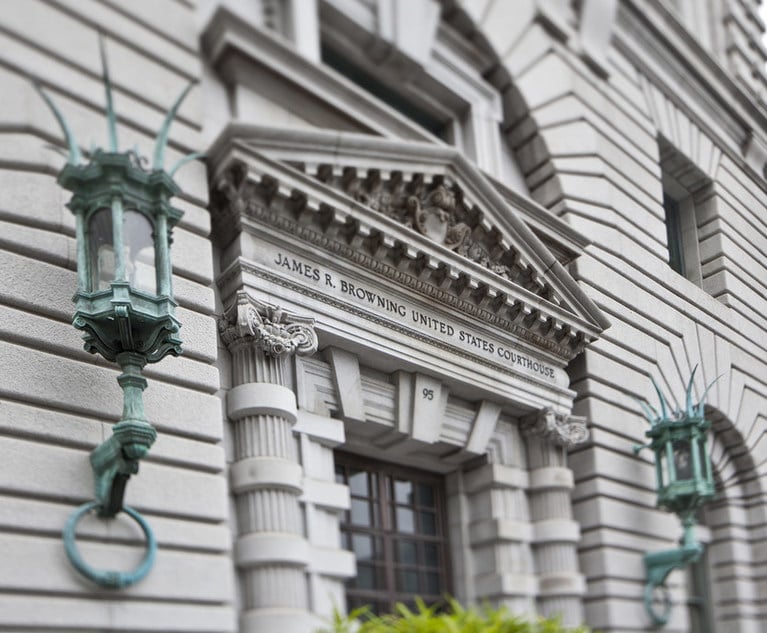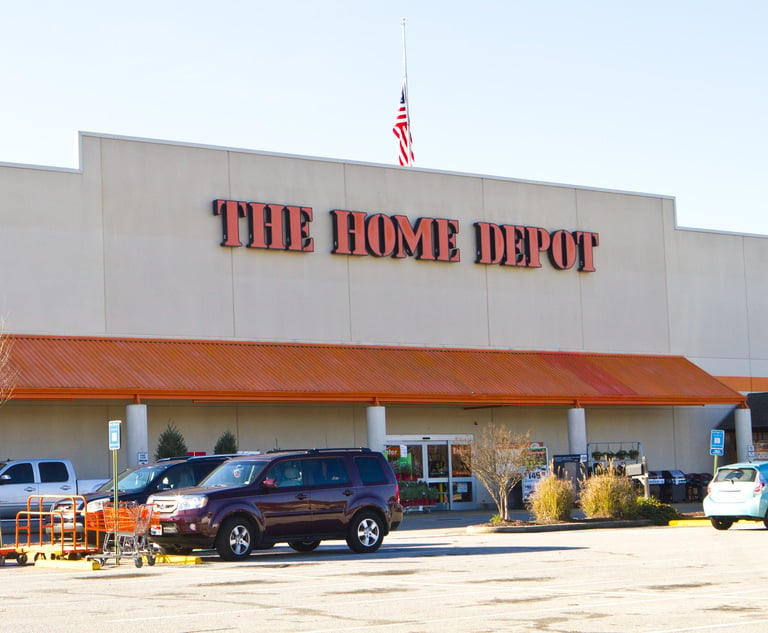 U.S. Court of Appeals for the Ninth Circuit in San Francisco. Credit: Jason Doiy/ALM
U.S. Court of Appeals for the Ninth Circuit in San Francisco. Credit: Jason Doiy/ALMWill the 9th Circuit Still be Center Stage in Trump Policy Challenges?
Lawyers challenging Trump’s second-term policies might eye the First Circuit, in addition to the Ninth, said University of Pittsburgh law professor Arthur Hellman.
November 12, 2024 at 04:24 PM
6 minute read
What You Need to Know
- Shift at 9th Circuit, court's limited en banc may make venue less appealing to blue state AGs.
- 1st Circuit may be viewed as alternative to 9th Circuit in some cases, court watchers say.
- District court assignment, circuit case law also factors.
Just days after President-elect Donald Trump won the election, blue state attorneys general said they are already strategizing on how to fight the incoming administration’s policies—including where to file their lawsuits.
California Attorney General Rob Bonta told Politico last week that his lawyers already "have gone down to the detail of what court do we file in." And other Democratic attorneys general, including in New York, Massachusetts and Maryland, issued similar statements about plans to oppose Trump policies in court.
Shifting Ninth Circuit
But will the U.S. Court of Appeals for the Ninth Circuit—widely considered the country’s most liberal federal appeals court and one Trump has directly criticized—return to being at the center of legal battles over Trump's policies, as was the case in his first term? Or, might lawyers look elsewhere?
Court watchers say they still expect the Ninth Circuit to be the site of plenty of legal action, but more fights could play out elsewhere this time around, especially given how Trump’s conservative appointees chipped away at the circuit’s liberal majority. Trump added 10 judges to the Ninth Circuit, with 13 of the court’s 29 active judges now appointed by Republican presidents and 16 by Democrats.
On top of that, the court has a “limited en banc” process that’s different from other courts. Instead of all active judges hearing en banc cases, the Ninth Circuit picks 10 active judges randomly plus the court’s chief judge to hear appeals en banc.

“[Trump] brought the [number of Republican appointees] up to 13, which is higher than it had been in a long time,” said University of Pittsburgh law professor Arthur Hellman, who studies the Ninth Circuit.
“Even though there is a majority of Democratic appointees, you can get an en banc court with a majority of Republican appointees," Hellman added. "And for that reason, it may be that groups challenging Trump administration policies will look for other circuits where they ... know what the en banc court will be.”
Where Else?
The concept of “forum shopping” isn’t new. Democratic-led states and progressive groups have turned to the Ninth Circuit in past administrations hoping for favorable rulings, while Republicans have gone to the more conservative Fifth Circuit to challenge President Joe Biden’s policies.
However, the judiciary has recently sought to combat more specific “judge shopping,” where lawsuits are filed in single-judge divisions to guarantee a particular judge hears the case. Republican-led states often chose the single-judge Amarillo division in the Northern District of Texas to challenge Biden’s policies, where Trump-appointee Judge Matthew Kacsmaryk sits.
Lawyers challenging Trump’s second-term policies might eye the First Circuit, in addition to the Ninth, Hellman said.
Five of the court’s six active judges were named by Democratic presidents: four by Biden and one by Obama. Biden has tapped Maine Superior Court Judge Julia Lipez to fill one still-vacant seat, but she is awaiting a floor vote by the Senate in the lame-duck session, which ends in mid-December.
If confirmed, every active judge would be a Democratic appointee. The court’s only active Republican-appointee Judge Jeffrey Howard took senior status in 2022.

Aileen McGrath, a partner in Morrison Foerster's appellate and Supreme Court practice, said that whether there’s unique circuit or district case law relevant to a particular case will also matter in deciding venue.
“[This] probably again points in favor of seeing cases in the 9th, where that court and the district courts heard similar challenges years ago and largely ruled in favor of plaintiffs,” McGrath stated via email.
While expecting many cases to be filed in the Ninth Circuit, McGrath agreed the First Circuit could be a new front.
She added that district court assignment will also factor into venue strategizing.
The U.S. District Court for the Northern District of California will likely continue to be a preferred venue for those challenging Trump’s policies, given that 23 of the court’s 25 judges were appointed by Democratic presidents. In Trump's first term, judges in the district shot down his immigration policies, including his asylum bans and “Remain in Mexico” policy.
“Winning before the district court will continue to be an important focus of these plaintiffs, and the odds of a victory before the Northern District of California may outweigh any slight shift in odds at the Ninth Circuit compared to eight years ago,” McGrath said.
Jeremy Fogel, executive director of the Berkeley Judicial Institute, said the trial courts are a key consideration due to their factfinding function.
“A reviewing court is limited by the record that was made in the district court in terms of factual issues," said Fogel, a former judge in the Northern District of California. "And so I think part of the analysis of ‘where do you file?’ has to do with your sense of the reception you're going to get in the district court.”
Other likely venues Hellman pointed to are the Fourth Circuit and D.C. Circuit, where challenges to agency actions are often lodged.
The Fourth Circuit has a 9-6 majority of active Democratic appointees, and 13 of 19 of its sitting judges were picked by Democratic presidents. Biden didn’t shift the balance of the court but further cemented that majority with three appointments, Hellman said.
A fourth Biden pick, North Carolina Solicitor General Ryan Park, is awaiting Senate confirmation.
The full circuit—which covers Maryland, the Carolinas, Virginia and West Virginia—allowed a lawsuit by Maryland and the District of Columbia attorneys general to proceed that accused Trump of violating the Constitution’s emoluments clause. The en banc court revived the case after a three-judge panel composed of judges appointed by Republican presidents had dismissed it.
The Fourth Circuit, like the Ninth, also ruled against Trump’s ban on visitors from Muslim-majority countries.
“The Fourth Circuit has a solid majority of Democratic appointees. And furthermore, that court has shown itself quite willing to use the en banc power to overturn rulings by conservative [panel] majorities and use the en banc power, I would say, aggressively,” Hellman said. He also cited an August 10-5 en banc decision in which the court upheld a Maryland assault weapons ban.
NOT FOR REPRINT
© 2025 ALM Global, LLC, All Rights Reserved. Request academic re-use from www.copyright.com. All other uses, submit a request to [email protected]. For more information visit Asset & Logo Licensing.
You Might Like
View All
Is 1st Circuit the New Center for Trump Policy Challenges?

Insurance Policies Don’t Cover Home Depot's Data Breach Costs, 6th Circuit Says

'Religious Discrimination'?: 4th Circuit Revives Challenge to Employer Vaccine Mandate
2 minute read
Standing Spat: Split 2nd Circuit Lets Challenge to Pfizer Diversity Program Proceed
Trending Stories
Who Got The Work
J. Brugh Lower of Gibbons has entered an appearance for industrial equipment supplier Devco Corporation in a pending trademark infringement lawsuit. The suit, accusing the defendant of selling knock-off Graco products, was filed Dec. 18 in New Jersey District Court by Rivkin Radler on behalf of Graco Inc. and Graco Minnesota. The case, assigned to U.S. District Judge Zahid N. Quraishi, is 3:24-cv-11294, Graco Inc. et al v. Devco Corporation.
Who Got The Work
Rebecca Maller-Stein and Kent A. Yalowitz of Arnold & Porter Kaye Scholer have entered their appearances for Hanaco Venture Capital and its executives, Lior Prosor and David Frankel, in a pending securities lawsuit. The action, filed on Dec. 24 in New York Southern District Court by Zell, Aron & Co. on behalf of Goldeneye Advisors, accuses the defendants of negligently and fraudulently managing the plaintiff's $1 million investment. The case, assigned to U.S. District Judge Vernon S. Broderick, is 1:24-cv-09918, Goldeneye Advisors, LLC v. Hanaco Venture Capital, Ltd. et al.
Who Got The Work
Attorneys from A&O Shearman has stepped in as defense counsel for Toronto-Dominion Bank and other defendants in a pending securities class action. The suit, filed Dec. 11 in New York Southern District Court by Bleichmar Fonti & Auld, accuses the defendants of concealing the bank's 'pervasive' deficiencies in regards to its compliance with the Bank Secrecy Act and the quality of its anti-money laundering controls. The case, assigned to U.S. District Judge Arun Subramanian, is 1:24-cv-09445, Gonzalez v. The Toronto-Dominion Bank et al.
Who Got The Work
Crown Castle International, a Pennsylvania company providing shared communications infrastructure, has turned to Luke D. Wolf of Gordon Rees Scully Mansukhani to fend off a pending breach-of-contract lawsuit. The court action, filed Nov. 25 in Michigan Eastern District Court by Hooper Hathaway PC on behalf of The Town Residences LLC, accuses Crown Castle of failing to transfer approximately $30,000 in utility payments from T-Mobile in breach of a roof-top lease and assignment agreement. The case, assigned to U.S. District Judge Susan K. Declercq, is 2:24-cv-13131, The Town Residences LLC v. T-Mobile US, Inc. et al.
Who Got The Work
Wilfred P. Coronato and Daniel M. Schwartz of McCarter & English have stepped in as defense counsel to Electrolux Home Products Inc. in a pending product liability lawsuit. The court action, filed Nov. 26 in New York Eastern District Court by Poulos Lopiccolo PC and Nagel Rice LLP on behalf of David Stern, alleges that the defendant's refrigerators’ drawers and shelving repeatedly break and fall apart within months after purchase. The case, assigned to U.S. District Judge Joan M. Azrack, is 2:24-cv-08204, Stern v. Electrolux Home Products, Inc.
Featured Firms
Law Offices of Gary Martin Hays & Associates, P.C.
(470) 294-1674
Law Offices of Mark E. Salomone
(857) 444-6468
Smith & Hassler
(713) 739-1250










